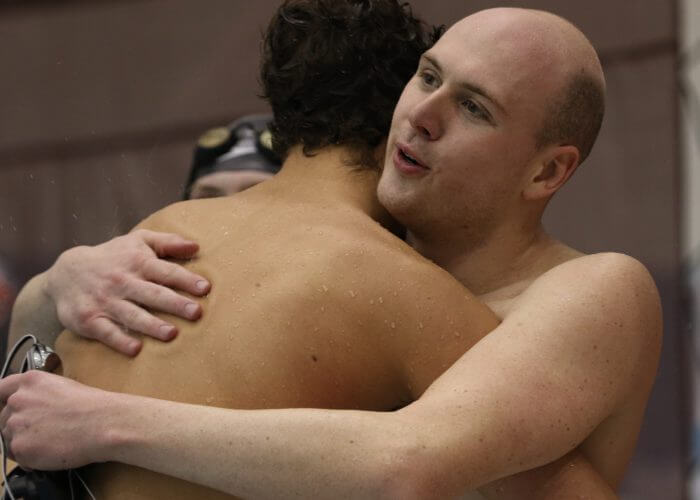Four Reasons Why Being The Underdog Can Be a Good Thing

By Nick Pecoraro, Swimming World College Intern.
Underdogs – who are they? An underdog is a competitor who is expected to have little chance of winning a contest. It could be anyone: that one swimmer who just can’t quite keep up in practice or who always ends up in second because of a superstar who is much faster. Though typically out of the spotlight, being an underdog is not such a bad thing.
One of the most memorable examples of a great underdog story happened during the 2008 Beijing Olympics – the men’s 4×100 free relay (yes, that one). Going into the event, the United States were actually the underdogs next to France. However, it wasn’t until the last 50 meters that Jason Lezak made one of the greatest comebacks in sports history to out-touch France and help the United States win an unexpected gold medal.
So, what makes the underdog such a beloved character? Bryan Kramer, CEO of PureMatter, highlights that the beloved story of an underdog is “a journey that captures relatable challenges and seemingly insurmountable odds, only to be overcome by the little guy in the face of adversity.”
In his article about why it’s better to be the underdog, Kramer refers to many positive qualities of the underdog; however, a few themes stand out as the most important qualities that really draw out why you shouldn’t be ashamed of being an underdog. The following four points – told from the perspective of an anonymous college swimmer we’ll call Noah – will flesh out the many hidden perks that come with being the underdog.
1. It reveals a more human side.

Photo Courtesy: Jeremy Crawford
Many underdogs, like Noah, have experienced the dark side of being an underdog. Noah draws out what being an underdog really is like:
“In middle school, I was not the fastest swimmer. Not keeping up in practice and missing championship cuts became a norm for me. Even in high school, I was always told I was too slow by people I swam with. After swim practice, I left the pool feeling defeated and humiliated. I came under the impression no matter how hard I tried, I wouldn’t succeed.”
Everyone can relate to this person who started at the bottom and worked his way up. It’s easy for spectators to look at superstars and treat them as untouchables. However, the underdog can give others hope that they, too, can accomplish unbelievable goals. After all, everyone’s human.
In the position Noah was in, you wouldn’t expect him to win anything. However, one of the great things that this human side reveals is that it doesn’t always have to be that way. The underdog tends to overcome society’s stereotypes and common beliefs. Many would not think that the loser would win – that’s where the underdog comes in. He comes in with no expectation to win and brings the biggest surprise that leaves those stereotypes baffled and stunned.
2. It instills dogged determination.

Photo Courtesy: Jeremy Crawford
Determination is a well-known quality of an underdog. Kramer points out that when being an underdog, “making a better life becomes your driving motivation.”
And Noah did just that; he found that kind of motivation to drive his determination to achieve his goals:
I just knew deep down that swimming would be something special. I put in so much effort into my practices that I left tired and weak from hard work. I kept track of all my times on a marker board in my room. I could basically recite swimming stats of Olympians and mimic their techniques and strategies in the water. Many people I swam with would tell me I wasn’t good enough, but I had this shear determination to make sure that never happened.
3. You have a bigger, clearer perspective.

Photo Courtesy: Jeremy Crawford
After many years of hard work, Noah did end up achieving his goals later on. However, through his eyes, he really saw what it was like to be in the top group:
When I reached college, I finally achieved big time drops and put myself on a scoring spot for our conference meet. It felt amazing, and I could not believe it. One thing I did notice was how upset some of my teammates were who didn’t make the scoring roster. Right then, I instantly felt for them, because I used to be in their shoes. I knew exactly what it felt like to be left out, undermined and embarrassed because you weren’t good enough. Experiencing both ends of the spectrum helped me learn not to take my journey for granted, and that I am not the only one who ever felt like the underdog.
In Noah’s story, he knew what it felt like to be at the top but also the bottom. This unique experience gives underdogs the ability to be humble and empathetic a little easier than those who’ve always been at the top.
4. You inspire others to succeed.

Photo Courtesy: Jeremy Crawford
“It’s the challenges that life throws at us that make us stronger and more resilient,” Kramer concludes. Noah agrees with this statement and opened up about how his unique story helped him want to inspire others:
In the midst of working towards my goals, I knew that there was one thing that could be in my way – arthritis. I was diagnosed when I started middle school, just three months before I started swimming. Yet, the one thing that could stop me became the one thing I would never let stop me. My arthritis became my main motive, and it was the reason why I became so determined. While many people my age might not have arthritis, they definitely know what it feels like to have something trying to stop them from achieving their goals. I love telling that story to people – not to show off my journey, but to maybe inspire them that anyone can succeed if they really put their hearts into it.
The underdog is here to prove that with a drive to succeed and hard work, anyone can achieve their goals. A wise coach once told his team that every person on the team, whether they were scoring at their conference meet or not, was valued in their own way. Whether you’re not quite fast enough for the championship meet or whether you have that one thing holding you back, know that you are important in your own way, just like an underdog.
All commentaries are the opinion of the author and do not necessarily reflect the views of Swimming World Magazine nor its staff.




Hanna Blewett